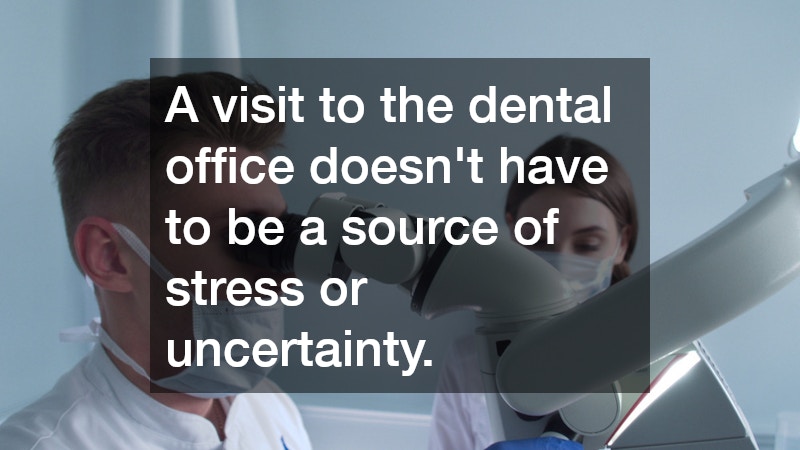Visiting the dentist is a key part of maintaining good oral health, yet many people still approach it with anxiety or uncertainty. Whether it’s your first appointment in years or just a regular check-up, there are ways to ensure your visit goes smoothly and effectively. By following several essential guidelines, you can get the most out of your time at the dental office and feel confident about your oral care.
Prepare Your Dental & Medical History
Before heading to your dental appointment, gather all relevant information about your medical and dental history. This is especially important if you’re visiting a new dental office for the first time.
Dentists need to know about past procedures, chronic illnesses, medications, allergies and any ongoing treatments. Providing complete and accurate information allows them to make well-informed decisions about your care. If you’ve recently had any health changes, even if they seem unrelated to oral health, it’s vital to let your dentist know. Conditions such as diabetes, heart disease or osteoporosis can influence the type of dental treatments that are appropriate for you.
Confirm Your Appointment & Arrive Early
Punctuality plays a significant role in the smooth operation of any dental office. Confirming your appointment a day or two ahead of time is courteous and ensures there are no miscommunications. Arriving at least ten to fifteen minutes early allows time to complete any necessary paperwork or update your information. It also gives you a moment to relax before your name is called, rather than arriving rushed or flustered. Dental appointments often run on tight schedules, so arriving early also helps the clinic maintain efficiency for all patients.
Practice Good Oral Hygiene Ahead of the Visit
While a professional clean is often part of your dental check-up, it’s still important to maintain good hygiene before your visit. Brushing and flossing your teeth on the day of your appointment is both considerate to your dental hygienist and helpful in allowing them to do a more thorough assessment. Avoid heavy meals or strongly flavoured foods beforehand to keep your mouth as fresh as possible. Proper hygiene not only makes the examination process easier but also reflects your commitment to dental health, which your provider will appreciate.
Communicate Your Concerns & Symptoms
One of the most beneficial things you can do during a dental visit is communicate openly with your dentist. If you’re experiencing discomfort, bleeding gums, tooth sensitivity or jaw pain, make sure to bring it up during the consultation. Even if the issue seems minor, early intervention can prevent it from becoming a bigger problem. For those who experience dental anxiety, voicing these feelings allows the staff at the dental office to take extra care to ensure your comfort. They may offer sedation options, frequent breaks or simply a more compassionate approach.
Understand Your Treatment Options
During your appointment, your dentist may present different treatment options based on their findings. It’s essential to ask questions and understand the pros and cons of each approach. Don’t hesitate to request clarification on procedures, recovery times or costs involved. A reputable dental office will take the time to explain things in detail and help you feel informed about your oral health decisions. Understanding your options empowers you to make choices that align with both your health needs and budget.
Follow Post-Visit Instructions Carefully
If your appointment includes a cleaning, filling, extraction or any other procedure, you’ll likely receive specific aftercare instructions. Following these instructions is crucial to your recovery and long-term oral health. For example, you may be advised to avoid eating for a few hours, rinse with a saltwater solution or take over-the-counter pain relief. Ignoring post-visit guidelines can lead to complications such as infection or delayed healing. If anything seems unclear, contact the dental office promptly to clarify.
Schedule Regular Visits & Maintain Preventative Care
Oral health is best managed through consistent, preventative care rather than reactive treatment. Your dentist will typically recommend visiting every six months, but the ideal frequency can vary based on your individual needs. Routine check-ups and cleans help catch issues early and prevent more serious problems down the track. Booking your next appointment before you leave the dental office ensures you stay on top of your dental schedule. Regular visits also allow your dental provider to build a long-term understanding of your oral health, making it easier to notice subtle changes or concerns.
Making the Most of Your Dental Visits for Long-Term Oral Health
A visit to the dental office doesn’t have to be a source of stress or uncertainty. With a little preparation and the right mindset, you can transform your appointment into a positive, productive experience. From communicating openly with your dentist to following up with proper care and scheduling, each step plays a role in maintaining a healthy smile. By applying these seven essential tips, you’ll not only get more out of each dental visit but also lay the foundation for long-term oral wellness.

